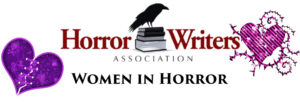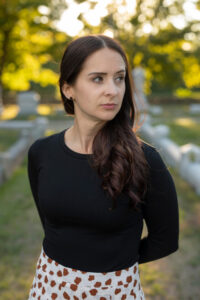Women in Horror: Interview with Christa Carmen


Christa Carmen lives in Rhode Island, and is the author of the short story collection, Something Borrowed, Something Blood-Soaked. Her debut novel, The Daughters of Block Island, is forthcoming from Thomas & Mercer in Fall 2023, and her second novel with the mystery, thriller, and true crime imprint will be out in Fall 2024. Christa studied English and psychology at the University of Pennsylvania and has an MA from Boston College and an MFA from the University of Southern Maine.
When she’s not writing, she keeps chickens, uses a Ouija board to ghost-hug her dear departed beagle, and sets out on adventures with her husband, daughter, and bloodhound/golden retriever mix. Most of her work comes from gazing upon the ghosts of the past or else into the dark corners of nature, those places where whorls of bark become owl eyes and deer step through tunnels of hanging leaves and creeping briers only to disappear.
What inspired you to start writing?
I have been writing in one capacity or another for as long as I can remember—painstakingly bound and hilariously illustrated short stories as a child, emo journal entries as an adolescent and when I was in treatment for substance abuse, impassioned nonfiction essays and decidedly weak attempts at memoir—but I didn’t start writing fiction until about 2014. I’ve always loved the Gothic, so my first completed project was a Gothic horror novel set in the Hundred Mile Wilderness in Monson, Maine … very Stephen King of me, I know. After that, I wrote predominantly short stories for a number of years, and then returned to writing novels at the start of 2019.
What was it about the horror genre that drew you to it?
I’ve always been interested in horror, starting with middle-grade books like Goosebumps and the Bunnicula series and working my way up to Fear Street and, eventually, Stephen King. I subscribe to the Jungian idea that we each have a shadow side to our personality, and I find writing horror the most satisfying way to explore mine and the most organic way to work through what truly terrifies me. I’m actually a little suspect of people who don’t enjoy horror, or at the very least, don’t acknowledge the essential nature of the horror genre within film and literature. That there’s darkness everywhere seems much easier to swallow when you’re used to facing that reality in your entertainment.
Do you make a conscious effort to include female characters and themes in your writing and if so, what do you want to portray?
Rather than a conscious effort, I’d say writing from the female perspective is so important to me that it’s become my unconscious default setting. I despise the deeply ingrained patriarchal hierarchy to our society—women as built-in therapists and nurturers and maids and scapegoats and, with the overturning of Roe v. Wade, literal breeding cows—and we still have such a far, far way to go to overcome that.
To me, the female perspective is the baseline for all my horror stories: motherhood in a society where the division of labor, of work-life balance, is persistently unbalanced; navigating addiction and recovery as a woman; fear of loss, fear for my child, fear of not being as good of a person as I hope myself to be, fear of self-destruction, fear of the apocalypse, fear of violence perpetrated against me (or my daughter). As a woman, these are the thoughts that swirl through my head when I sit down to write a short story or the first chapter of a new novel.
What has writing horror taught you about the world and yourself?
There isn’t much that’s not fodder for a horror story, either within the world or within myself.
How have you seen the horror genre change over the years? And how do you think it will continue to evolve?
Over the last ten years, I feel like the horror genre has changed for the better. Inclusivity and diversity can only make our community richer, and for every individual who has bristled against change or worked to keep the status quo, there are three hundred more who rise up to support those who’ve been silenced in the past, and that’s a really wonderful and encouraging thing to see.
That being said, our efforts cannot cease or even slow down, and I hope—and I am hopeful—that we will continue to make great strides as a community toward being open to and excited about horror stories written by people who’ve been marginalized for decades or even centuries. Personally, I adore discovering a new-to-me author whose experiences differ from my own. It’s invigorating, inspiring, enlightening, humbling, even revelatory. Diversity in literature—including horror literature—is what keeps our reading lives and, subsequently, our real lives fresh and challenging; we need windows as well as mirrors.
How do you feel women have been represented thus far in the genre and what hopes do you have for representation in the genre going forward?
Terribly… and wonderfully. It depends on where you look There’s no shortage of films and novels that continue to operate from the POV of the reductive, belittling, and/or predatory male gaze, but there is also no shortage of films and novels that treat their female protagonists, deuteragonists, and antagonists with respect, believability, and even reverence.
Some of the films over the last three years that have done this remarkably well are Run Sweetheart Run (Shana Feste, 2020), Lucky (Natasha Kermani, 2020), Watcher (Chloe Okuno, 2022), and Fresh (Mimi Cave, 2022). These female-helmed features are worth your time if you’re interested in seeing the woman-being-watched/stalked/chased/assaulted/butchered/killed tropes flipped completely on their heads. And for novels, works like Gwendolyn Kiste’s Reluctant Immortals (more on this one below), Hailey Piper’s Queen of Teeth, Kristi DeMeester’s Such a Pretty Smile, and, in the middle grade sphere, Lora Senf’s The Clackity are accomplishing similar feats of greatness with their female characters.
Who are some of your favorite female characters in horror?
Most recently, Gwendolyn Kiste’s versions of Bertha “Bee” Mason and Lucy Westenra in Reluctant Immortals, kickass supernatural women banishing the classic monsters of our past; Waynoka and Mads, of Jo Kaplan’s When the Night Bells Ring, a climate disaster/creature feature mashup where forgotten curses and future terrors collide; and Daisy and Claire, two elderly godmothers at the center of Cherie Priest’s 2019 Southern Gothic, The Toll.
Also, because I’m a mom and spend a huge portion of my time reading children’s books to a little girl who—through no swaying on my part, I swear!—loves reading about spooky things, I’m going to throw out a few children’s book characters who are absolutely delightful (because I know there are other horror moms out there who are always on the lookout for these types of recommendations). First, there’s Leila, the Perfect Witch, who is good at everything but the one thing she wants to excel at, baking cakes; Clarissa, of She Wanted to be Haunted, an adorable pink cottage and the daughter of a vampire castle and a witch’s hut, who discovers that it’s okay to be horrible and cute. And Vampirina from the Vampirina Ballerina series (the basis for the Disney television show, but a bit more understated and, frankly, a whole lot sweeter in its emphasis on an Addams Family-esque family dynamic) by Anne Marie Pace.
Who are some women who write horror you recommend our audience check out?
Some contemporary women in horror that I love reading are Gwendolyn Kiste, Stephanie M. Wytovich, Nadia Bulkin, Ania Ahlborn, Jac Jemc, Alma Katsu, Christina Sng, Elizabeth Hand, Nancy Holder, Anya Martin, Erin Sweet Al-Mehairi, Renee Miller, Theresa Braun, Carmen Maria Machado, Kelly Link, EV Knight, Laurel Hightower, Belicia Rhea, Marisca Pichette, Damien Angelica Walters, Lauren Groff, Caroline Kepnes, Ruth Ware, Sarah Pinborough, K.P. Kulski, Jessica McHugh, Annie Neugebauer, Hailey Piper, Kathe Koja, Claire C. Holland, Victoria Dalpe, Tamika Thompson, Rebecca Allred, Leanna Renee Hieber, Faye Ringel, Mary Robles, H.Y. Hsu, Lee Murray, Geneve Flynn, and L.E. Daniels.
I’m probably forgetting at least a hundred amazing women, but I try to post regularly in support of women, trans, and nonbinary writers whose work I admire.
What is one piece of advice you would give horror authors today?
Keep writing. Do not stop. Turn all of your anger and disappointment and dissatisfaction (and, to keep with the theme of darkness versus light I touched on earlier in this interview: all of your job, success, and happiness, too!) into stories. Those stories make the world the magical place it is. Those stories have power. Those stories are what we need to inspire the next generation of writers to make things better for humanity than what we have now.
And to the women who write horror out there who are just getting started, what advice would you give them?
See my answer above! It’s the same advice whether you’ve been writing for fifty years or five minutes. If writing is something you want to do, don’t just talk about it, do it and enjoy every second of it, even the tough, trying, troubling times. It’s a real gift to harbor a talent and passion for writing. Embrace it, and share it with others, if you’re so inclined!



